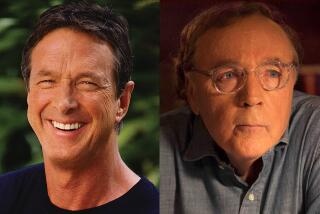Charles Crichton; British Director of Movie Comedies
- Share via
Charles Crichton, British director of classic comedy films who followed a long hiatus from motion pictures with a remarkable comeback and an Academy Award nomination in 1989 for “A Fish Called Wanda,” has died. He was 89.
Crichton, who helped make London’s Ealing Studios the hallmark of British comedy in the late 1940s, died Tuesday at his home in London.
The director built a solid reputation with three much-loved Ealing comedies written by T.E.B. Clarke--the studio’s first, “Hue and Cry” in 1947, “The Lavender Hill Mob” in 1951 starring Alec Guinness and “The Titfield Thunderbolt” in 1953.
Crichton became known for his reliance on well-written scripts and his exquisite sense of pace and timing, a result of his early years as a film editor for such 1930s classics as “Elephant Boy” and “Sanders of the River.”
He also directed quality non-comedies, including the Resistance drama “Against the Wind” in 1948 and “The Divided Heart” in 1954. But despite his long string of successes, including the 1959 Peter Sellers comedy “Battle of the Sexes,” Crichton’s film career seemed to wane along with Ealing Studios.
In 1962, he quit “Birdman of Alcatraz” in mid-production, turning over the directing to John Frankenheimer, after an argument with the film’s star and producer, Burt Lancaster.
After that setback, Crichton directed only a couple of other films, “He Who Rides a Tiger” in 1966 and “Tomorrow’s Island” in 1968, before turning to British television.
For two decades, he earned his living directing British television shows, including “The Avengers,” and corporate videos for Monty Python veteran John Cleese’s Video Arts.
Crichton and Cleese had tried to make a movie together in 1969, but it fell through. Still, they never gave up the idea, and the result--in which they shared writing credits and the resulting Oscar nomination for best screenplay--was “A Fish Called Wanda.”
Cleese also shared directing credits, but later admitted that he knew nothing about directing and that it was Crichton’s show. The actor said he only listed himself as co-director to reassure studio executives who were worried about Crichton’s age--he was 78 at the time.
The cast of “Wanda,” including Cleese, kidded Crichton about his “mumbling” on the set, but all accepted his sure, clean direction. The film, somewhat reminiscent of “The Lavender Hill Mob,” established the director’s reputation with a new generation of filmmakers.
For the final decade of his life, Crichton delighted in telling how one of “Wanda’s” producers got a call from a Hollywood studio executive after the successful film was released, saying: “We’ve got a comedy we need a director for. Do you think your new young guy, Crichton or whatever his name is, would be interested?” The septuagenarian Crichton was otherwise engaged.
Among other films directed by Crichton were “For Those in Peril,” “The Painted Canal,” “Dance Hall,” “The Love Lottery,” “The Man in the Sky,” “Law and Disorder,” “Floods of Fear,” “The Boy Who Stole a Million” and “The Third Secret.”
Crichton is survived by his second wife, Nadine, and two sons, David and Nicholas.
More to Read
Only good movies
Get the Indie Focus newsletter, Mark Olsen's weekly guide to the world of cinema.
You may occasionally receive promotional content from the Los Angeles Times.










